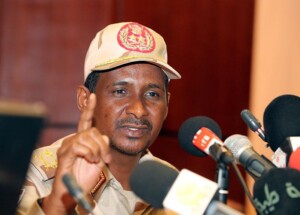FFC 80% in agreement with Sudan military but criticises El Burhan’s ‘political manoeuvring’
The Forces for Freedom and Change-Central Council (the mainstream FFC) announced that they have reached an agreement with the military on roughly 80 per cent of issues. ‘Thorny and complex issues’ remain not agreed upon, however, and the FFC is critical of the military leader’s ‘political manoeuvring’.
 Shehab Ibrahim, spokesperson for the FFC-CC (Alyoum Altali)
Shehab Ibrahim, spokesperson for the FFC-CC (Alyoum Altali)
The Forces for Freedom and Change-Central Council (the mainstream FFC) announced that they have reached an agreement with the military on roughly 80 per cent of issues. ‘Thorny and complex issues’ remain not agreed upon, however, and the FFC is critical of the military leader’s ‘political manoeuvring’.
Spokesperson Shehab Ibrahim explained that “there are thorny and complex issues that have not yet been agreed upon between the two parties, regarding justice issues, the Empowerment Removal Committee (ERC*), and the reform of the security service and the military” in a press conference in Khartoum yesterday.
'There are thorny and complex issues that have not yet been agreed upon' – Shehab Ibrahim
As for amendments to the October 2020 Juba Peace Agreement about 30 per cent has been agreed on so far.
“We know that these issues are complex and not easy,” Ibrahim said, “but we expect that before the end of the year we will reach an agreement that will end the political crisis and establish a full civil authority”.
Ibrahim further explained that the military junta agreed that the draft constitutional charter developed by the Sudanese Bar Association (SBA) serves as a basis for resolving the crisis. The FFC will discuss the comments of the military junta tomorrow.
“We can certainly say that the political crisis is approaching a final solution and that the constitutional charter draft addresses all issues of the revolutionaries on the ground.”
Negotiations and speeches
The AU-IGAD-UN Trilateral Mechanism recently announced that it will facilitate a new set of negotiation meetings. The mechanism talked about 'a glimmer of political hope' and wrote that "we now have a workable document upon which further consensus can be built," referring to the SBA draft.
Chairman of Sudan’s Sovereignty Council and Commander-in-Chief of the Sudan Armed Forces (SAF) Lt Gen Abdelfattah El Burhan has given a series of speeches to police and military forces recently in which he also commented on the negotiations on a new political framework for Sudan.
In his speech to soldiers on Sunday, El Burhan said that the SAF has received the new constitutional framework document, based on the SBA’s draft.
“It is true that there has been a document presented to us in reference to the new proposed transitional constitution. We sent in our comments, which are to preserve the army’s dignity, unity, and independence, and that we will not allow anyone to tamper with the armed forces or interfere with them".
'We will not allow anyone to tamper with the armed forces or interfere with them' – Lt Gen El Burhan
Regarding the recent speeches of El Burhan to army and police forces in Khartoum and Omdurman, the FFC spokesperson said that there are three messages that the coup leader wanted to convey in his speeches.
Ibrahim explained that, firstly, El Burhan said the solution will be based on the Constitutional Charter developed by the SBA.
The second is a warning message directly related to the defunct regime and its work, particularly within the police and security services, as the defunct regime of Omar Al Bashir and his National Congress Party (NCP) was betting on a new military coup to bring it back to power again.
El Burhan’s military junta, however, has frequently been accused of bringing the Islamists and others affiliated with the former dictatorship, including NGOs and unions, back into positions of political power.
The FFC itself has also pointed out that "the military junta has been facilitating the return of political Islamists from the terrorist regime" of Omar Al Bashir, which was responsible for many human rights violations including genocide in Darfur.
Ibrahim explains that El Burhan was only able to target the NCP in his warning messages because “regional and international changes were able to curb the role of the Islamists and the defunct regime”.
The third and last message, present in yesterday’s speech to the police, is meant to reassure the regular forces of the army and police so that they do not block any path towards a political solution, Ibrahim said.
“El Burhan has entered a dilemma since the October 25 coup and wants to get out of it,” the FFC spokesperson explained.
'El Burhan has entered a dilemma since the October 25 coup and wants to get out of it' – Shehab Ibrahim
Ibrahim considered El Burhan's talk about “brandishing weapons in the event that the civilian government deviated from the path” as negative messages and a kind of testament against the civilian political forces. He described it as ‘political manoeuvring’.
Full civilian authority
The Executive Office of the mainstream FFC renewed its adherence to full and real civil authority without guardianship from any party.
The office said in a statement after its meeting on Sunday that it had listened to the comments of the military, delivered to the Trilateral Mechanism.
The FFC affirmed its adherence to the military institution's disassociation from political work and the implementation of the necessary reforms that lead to a single professional and national army.
It also stressed that it adheres to “a comprehensive process of transitional justice” with the broad participation of all stakeholders. The FFC valued any steps that are taken in the direction of building a unified civil front.
The statement stressed that the FFC coalition distanced themselves from working among the armed forces.
The FFC further decided to escalate campaigns to demand the release of political detainees, including member of the FFC Executive Office and former head of the ERC Wajdi Saleh, member Abdallah Suleiman, and others.
* The full name of the committee is the Committee for Dismantling the June 30 1989 Regime, Removal of Empowerment and Corruption, and Recovering Public Funds. It was established by the government of Abdallah Hamdok at the end of 2019 with the aim to purge Sudan of the remnants of the Al Bashir regime. Empowerment (tamkin) is the term with which the ousted government of Omar Al Bashir supported its affiliates by granting them far-going privileges, including government functions, the setting-up of various companies, and tax exemptions.











 and then
and then